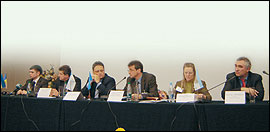 |
International Conference on Sustainable Development of the Danube DeltaA vision for development of the Danube Delta shared by Moldova, Ukraine andRomania was the goal of an international conference in Odessa that includedrepresentatives of governments, NGOs, scientists and local officials. |
 |
The International Conference on Sustainable Development of the Danube Delta, held in February in Odessa, Ukraine, developed steps towards sustainable development. The next months will show how the common vision can be put into practice. |
At the crossroads between the sea and the large inland emerging economies in the Danube River Basin, the Danube Delta region has both great economic potential and cultural and ecological values. Navigation and river transport provides income in the Danube Delta region. The challenge is to make these activities compatible with environmental requirements.
The International Conference on Sustainable Development
of the Danube Delta was hosted by the government
of Ukraine with the support and involvement of international organisations including the ICPDR, UNESCO, Council of Europe, RAMSAR Convention, WWF and the European Union. The conference, although
dealing with such projects as the Bystroe Canal and Moldovan Oil Terminal, was intended to focus on long-term development in the Delta and to serve as a basis for establishing a common vision of development in the Delta.
A background document for the conference outlined the challenges that exist: “The Danube Delta forms the core zone of a culturally and geographically unique
region, situated at a strategic place in Europe. …To provide long-term benefits, however, regional development
has to be planned and undertaken on a functional scale and in a sustainable way, to take into account existing ecological limitations and sensitivities, and be based on a common vision and cooperation among the three countries sharing the area: Romania, Ukraine and the Republic of Moldova.”
A shared vision.
The conference brought together experts
of the three countries, and of the international organisations concerned about the area, to exchange views and work towards a shared vision for transboundary
socio-economic development of the Delta region, in its European context.
Results from the conference include the agreement to implement a single methodology for assessing the environmental impact in a transboundary context of projects planned and carried out in the Danube Delta based on the ESPOO Convention.
An important part of the discussions was the common management of the Delta. Conference participants agreed to support the establishment of an expert group under ICPDR leadership to prepare a river basin management
plan for the Danube Delta sub-basin based on the approach and methodologies of the EU Water Framework Directive. This group would also coordinate
with existing mechanisms to reduce upstream pollution from other Danube countries; ensure public participation and public access to information on water management; and develop a common mechanism for monitoring water quality, availability, distribution and the impact from human activities.
Steps for the future.
Recommendations included finalising
the ratification process for the 2000 Trilateral Agreement between the three countries and continuing
the work of the Joint Commission established under
the agreement, and the establishing of a trilateral transboundary biosphere reserve under the UNESCO Man and the Biosphere Programme.
A follow-up meeting with a small number of experts from each country, both governmental and non-
governmental and the international organisations will be held before the end of the year in order to monitor progress.